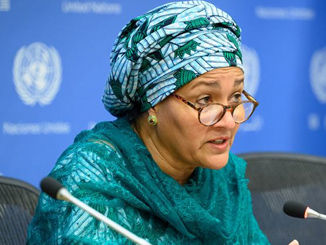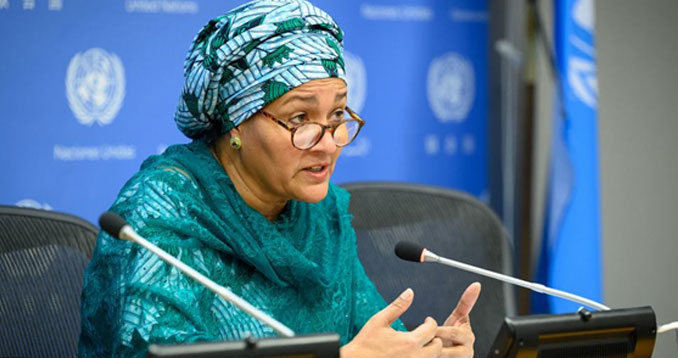

Traveling with UN Women chief Sima Bahous, and other senior officials, Deputy Secretary –General Amina Mohammed on Thursday that she had informed Taliban leaders that a society based on exclusion and repression could never flourish.
The first goal of the visit focused on “solidarity and the importance of women’s rights…with a view to education, secondary and tertiary”.
Tweet URL
The deputy UN chief stressed that non-discrimination is vital, and that sustainable peace could not be achieved when the rights of women are ignored.
When speaking directly to fundamentalist Taliban leaders about humanitarian principles, she reminded them that they were “wiping out” women from the workplace, she told correspondents in New York on Wednesday.
Drawing attention to their impacts in the fields of medicine and education, the deputy UN chief highlighted the need to push the issue to “the very limits”.
Moreover, the deterioration of humanitarian spaces constitutes “double jeopardy” because it impacts women’s rights and costs lives.
However, she acknowledged, “it is a tough call” when saving lives and maintaining women’s and children’s rights. “[There is] a difficult tension and a very fine line to navigate, as we do this, but we tried the best that we could”, said Ms. Mohammed.
When the Taliban said it would restore rights to women and girls in due course, she questioned whether their actual time span referred to 10, 20 or 50 years’ time. “Let’s have a timeline. Let’s be very specific about this”, she pressed. They had indicated that it would be soon, she added.
In the capital Kabul, Amina Mohammed recounted that women urged her to “meet with us first and not last, so you really do hear what we want to say going in”. Describing the trip as a “whole of society, government approach”, she maintained that “the international community needs to have that unified response”
They held meetings with former President Hamid Karzai, former Prime Minister Abdullah Abdullah and a host of high-level officials as well as with women from NGOs, UN staff, and youth working with UN Women.
Iranian Foreign Minister, Hossein Amir-Abdollahian said that the ban imposed by the Taliban on university education for women contradicts Islamic teachings, at the meeting of the Economic Cooperation Organization (ECO) Council of foreign ministers. Amir-Abdollahian emphasized on the formation of an inclusive government in Afghanistan.
According to Iranian foreign minister, the formation of an inclusive government in Afghanistan will not only facilitate the provision of aid to Afghanistan and rebuilding the country, but will also reduce terrorist threats, as well as refugees and drug trafficking issues.
Iran’s foreign minister’s statement on the ban on university education for women in Afghanistan coincides with the International Day of Education 2023. The UN delegation also held meetings relating to the Afghanistan crisis in Türkiye, Indonesia, some of the Gulf States – including Saudi Arabia – Kazakhstan, the United Kingdom, and within the European Union.
Ms. Mohammed detailed meetings in the Taliban heartland of Kandahar and Herat, where the Taliban complained of not being given due credit for reforms. “We reminded them that even in the case where they talked about rights, edicts that they had promulgated for protecting women, they were giving rights with the one hand and taking away with the other, and that was not acceptable”.
Women and children have been the most impacted by the humanitarian crisis in Afghanistan. For the UN, she said the Taliban’s aim of creating an environment that protects women – such as structures on education and the curriculum; work and the hijab – “are all red flags that we need to look at and to see that we are not completely losing all rights for women and children”.
While there is no history of the Taliban reversing any edicts, the senior UN official flagged that “what we have seen” are exemptions which, if we keep pushing, will “water down the edicts to the point where we will get women and girls back into the workplace”.
She reminded that UN Humanitarian Coordinator Martin Griffiths is there currently, building on humanitarian work underway since last year.
“I hope this trip has contributed to reinforcing our demands that these bans are reversed, reinforcing the demands of women’s rights and girl’s rights to be respected”, she stated.
Further engagement is needed, because there is no “one-fix wonder”, Ms. Mohammed said, adding that space must be created to unify the international community.
The Deputy Secretary-General, who is herself a Muslim, called on Islamic and neighbouring countries to “take much more of a stand”.
“Every time I went to one of these Muslim countries, they did reinforce the fact that Islam did not ban women from education or from the workplace”, she said, encouraging forward action by building on that momentum.
“They are the neighbours, they are engaging”, said the UN deputy chief, calling for concerted international support, to restore “what we lost in the last few months”.

Leave a Reply